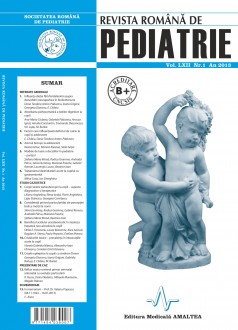SELECT ISSUE

Indexed

| |

|
|
|
| |
|
|
|

|
|
|
|
|
|
|
HIGHLIGHTS
National Awards “Science and Research”
NEW! RJP has announced the annually National Award for "Science and Research" for the best scientific articles published throughout the year in the official journal.
Read the Recommendations for the Conduct, Reporting, Editing, and Publication of Scholarly work in Medical Journals.
The published medical research literature is a global public good. Medical journal editors have a social responsibility to promote global health by publishing, whenever possible, research that furthers health worldwide.
Psychosomatic approaches to digestive diseases in children
Ana-Maria Ciubara, Gabriela Paduraru, Ancuta Ignat, Amalia Constantin, Smaranda Diaconescu, Valeriu V. Lupu and M. Burlea
ABSTRACT
Psychosomatic diseases refer to those medical affections whose appearance and/or evolution is significantly influenced by psychological factors. The main digestive disorders in which the psychosomatic factor is prevalent are: gastroduodenal affections, corrosive esophagitis, constipation, encopresis, emotional diarrhoea, irritable bowel syndrome, ulcerative rectocolitis and Crohn’s disease. The management is based on collaboration between the psychologist and the pediatric gastroenterologist. Supportive psychotherapy is necessary for completing medication. Child should receive emotional support and be helped to understand their feelings about the situation of the disease. The doctor must create a relationship based on trust, develop an attitude that shows empathy, honesty and openness towards children.
Key words: psychosomatic, gastroenterology, child
